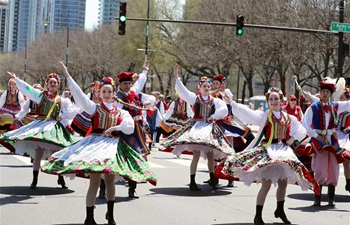By Peter Mertz
LOS ANGELES, May 6 (Xinhua) -- California conservative lawmakers continued this week to support Trump Administration immigration policy, a move that enflamed again the war of words in the state and feud between the America's most populous state and Washington.
TANGLED LAW WARFARE
California made history by becoming the first "Sanctuary State" in the country as a new law, which was called SB (Senate Bill) 54 before being signed by Governor Jerry Brown last October, showing a will to resist the White House's immigration policy, went into effect from the first day of this year.
Then the Golden State had to face pressure from the federal government for its rebellious move. Early March, the Department of Justice filed a lawsuit against the state, its governor, and its attorney general, accusing them of violating the U.S. Constitution.
This legal move was compared by Jerry Brown to "an act of war", but more challenges to the law, which vastly limits cooperation between state and local law enforcement officers with the federal Immigration and Customs Enforcement agency, emerged inside his state.
Costa Mesa, a tiny city of 110,000 residents south of Los Angeles, made another loud national statement with a 3-2 vote last Wednesday to oppose the state's "sanctuary state" law. It is the latest Orange County governing body to declare official opposition.
The opposition to SB 54 started in March when Orange County's second-smallest city - Los Alamitos - voted 4-1 to exempt itself from California's sanctuary law.
That move triggered Orange County's Republican-controlled county council to vote unanimously later that month to do the same - defy the state sanctuary laws - and move immigration control to the local level.
County council members in the majority said SB-54 puts them at odds with the U.S. Constitution and also joined the federal lawsuit against California's sanctuary laws.
Orange County lawmakers cited examples of "illegal" immigrants convicted of domestic violence that were re-released into the public, while liberal opponents voiced dismay at a move that will target minority populations.
California Attorney General Xavier Becerra said he would fight Orange County in court, as all sides prepared for battle. "State law is state law," Becerra said in a news conference last month.
"We want to make sure that every jurisdiction, including Orange County, understands what state law requires of the people and the subdivisions of the state of California," he said, warning "It's my job to enforce state law and I will do so."
But now Becerra must file a long list of defendants to the court if he launched a law war against the rebellious cities. Besides of Costa Mesa, at least another 13 cities in Orange County voted against the "sanctuary law" and the neighbour San Diego County also decided to back Trump' s challenge against the state on this issue.
CLEAR DIVISION LINE
"Costa Mesa has been a conservative stronghold since the Nixon and Reagan years," said San Luis Obispo business owner John Ott.
"Lots of rich, retired white folk live there - not a surprise vote - in fact, I'm surprised it was so close," Ott told Xinhua Friday.
Orange County is more populous than 21 U.S. states, the sixth most populous country in America, and has only voted for only one democratic presidential candidate since 1936, who was Hillary Clinton.
"The 3-2 Costa Mesa vote was not unanimous - in fact very close," said Hollywood film editor Tim Craig, "Hey, it's Orange County, what else would you expect?"
The debate in Costa Mesa city council Wednesday morning was unexpected fierce. More than 100 people spoke on the issue over more than four hours in front of a large and sometimes rowdy crowd.
People in the audience expressed both sides of the issue, waving American flags and holding signs with messages such as "Immigrants in, racists out," "You must uphold the Constitution," "Respect our country" and "I support safe communities, I support SB 54."
Chairwomen of the meeting repeatedly admonished the audience for interrupting speakers with applause or boos. Several times she threatened to clear the chamber if the crowd didn't pipe down, and she asked police officers to temporarily remove people who were being disruptive.
Costa Mesa's vote dismayed civil rights groups across America.
"America is going backwards...marching to the Trump manifesto," political analyst David B. Richardson told Xinhua Saturday.
"There's been a real shift to a national, xenophobic acceptability in our society that is heartbreaking," said Rabbi Jonathan Klein, executive director of the Clergy & Laity United for Economic Justice group on Twitter.
"We're in an era of open bigotry," Klein said.
"It has nothing to do with bigotry," countered former U.S. Navy engineer Kirk Blue. "Police are trained to protect the public and if that means including demographic data, then it's crazy to hamper their work," he told Xinhua.
"Clearly the residents of Orange County want more law enforcement, not less," Blue said Saturday.
MORE SAFEY?
Costa Mesa's council members who supported the resolution said what they concerned most about SB 54 is that in many cases it prohibits local and state police agencies from notifying federal officials when they're about to release immigrants in their custody who may be subject to deportation.
"If you are putting people back on the street and then trying to re-apprehend them ... that puts people at risk," Mayor Sandy Genis said after the vote.
On the contrary, liberals told Xinhua that opposing the law would open the door to civil right's violations, and add work for already overburdened town cops who would be assisting in enforcement.
"The foremost spokesman for local enforcement of immigration laws - Arizona's Joe Arpaio - was also heavily criticized for ignoring reports of sexual assault when they came from Latina and Black women," said former U.S. State Department official Stewart King.
King told Xinhua that the Costa Mesa vote not only puts local cops on the firing line, but is simply not their job.
"This is the job for (U.S.) Immigration and Naturalization (INS) officials - not the work of local sheriffs," said Louis Cardona, a former Arizona resident who told Xinhua he was personally abused by Arpiao's forces.
"Arpiao had hundreds of sexual assault allegations go without investigation," said King, echoing social media concerned tweets after the Costa Mesa vote - that local law enforcement and immigration do not mix.
"Oregon has had a similar law since the 1980s," said King, a college history professor.
"State and local police are not empowered, funded, or trained to enforce immigration laws - that is the responsibility of federal immigration authorities," he told Xinhua.













